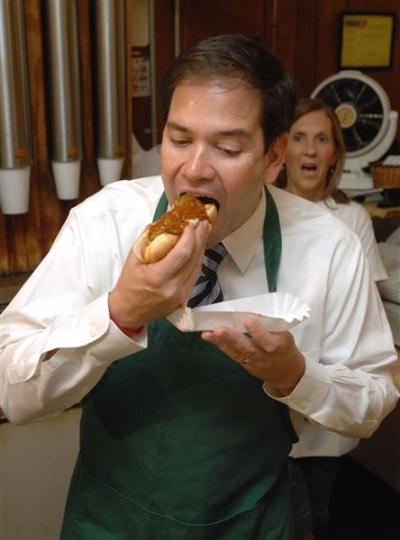
For someone who has spent most of his adult working life on a government payroll, Marco Rubio has certainly learned how to denigrate government. Echoing the miasma of Mitt Romney and more recently Jeb Bush, Rubio said of the first Democratic presidential debate: "It was basically a liberal versus liberal debate about who was going to give away the most free stuff. Free college education, free college education for people illegally in this country, free health care, free everything." Rubio, of course, is seeking a promotion from U.S. Senator, from which he pulls down $174,000 annually, to president, which over the course of two 4-year terms would enrich him to the tune of more than $3 million, excluding free room and board. When you're malnourished, you're grateful for surplus government cheese. But when you're a conservative, there's benefit in biting the hand that enriches you.
And that enrichment does not end with the salaries politicians receive. Rubio's $800,000 book deal isn't the result of his being a great writer (though he may well be)--it's the fruits of celebrity that government office often provides. Dr. Ben Carson has a personal story that's at least as inspiring as Rubio's, and, to his credit, his celebrity and autobiography preceded his pursuit of public office. That hasn't stopped Carson, however, from taking a book tour during the middle of his campaign to exploit the heightened notoriety and accompanying profit that seeking government office can confer. Carson, like Rubio, loves to lecture about the ills of big government.
In fact, the Republican presidential field is teeming with government-pimping government bashers. Gov. Bobby Jindal, once considered a boy wonder in Republican circles, hasn't vindicated his early promise--his approval ratings in Louisiana have kissed the dirt--but he has been on a government payroll since he was nearly a boy. Ted Cruz's launching pad to the U.S. Senate was his position as Solicitor General for the state of Texas; he now wants to run the very government that he's most famous for wanting to shut down.
Gov. John Kasich of Ohio, though marginally less of a government basher than his peers--he did opt into Obamacare's Medicaid expansion--is no less guilty of using his career in government to cash in. After serving as chair of the Budget Committee in the House of Representatives, Kasich became a well-compensated managing director at the now-defunct Lehman Brothers investment banking firm.
And the list goes on and on. Yet these champions of limited government are rarely if ever confronted with the discomforting mismatch of how much they talk government down versus the good life government has helped them to achieve. How can Marco Rubio complain about Democrats offering free college to Americans when he graduated from the University of Florida, which offers one of the least expensive public in-state tuitions? And what's with the reprisal of the "free stuff" insults to Americans who are genuinely in need of help, and who, unlike Rubio, do not have a billionaire benefactor to help bail them out of financial distress?
None of these internal contradictions may matter to the GOP base, even has it purportedly seeks an "outsider" as their party's standard bearer. To these voters, logic is elitism, and hypocrisy is only troubling sometimes--which is itself hypocritical. For the rest of us, though, Rubio et al. unwittingly symbolize the virtuous potential of government, even if they, themselves, have demagogued and abused it.


